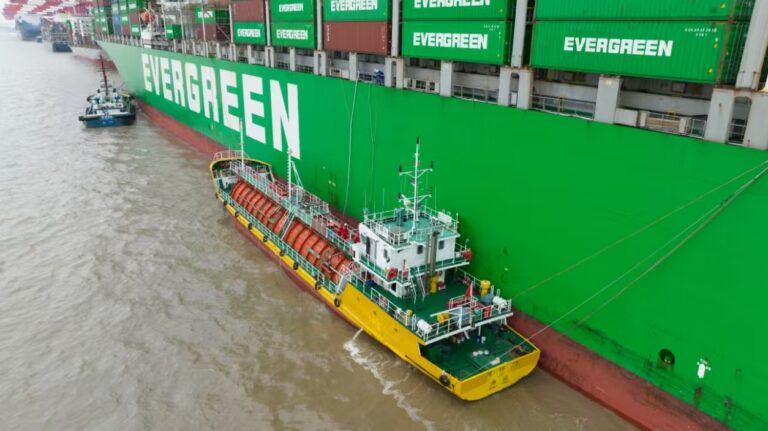The world’s first ship-to-ship liquified carbon dioxide (LCO₂) transfer was successfully completed on June 19 at the Yangshan Deep-Water Port in Hangzhou Bay, Shanghai. The project was led by SMDERI-QET (Shanghai Qiyao Environmental Technology), a subsidiary of Shanghai Marine Deisel Engine Research Institute (SMDERI), a unit of the China State Shipbuilding Company (CSSC).
The transfer marks the industry’s first ‘end to end’ solution, which includes onboard carbon capture, liquefaction, storage and ship-to-ship offloading to a carbon utilization facility. The Onboard Carbon Capture and Storage System (OCCS), developed by SMDERI-QET, achieved a carbon dioxide capture rate of over 80%, with a liquid carbon dioxide purity of 99.9%. Since the delivery of the first full-process OCCS in early 2024, SMDERI-QET has successfully completed multiple end-to-end LCO₂ offloading projects, from capture to recycling, which have enabled owners to achieve higher CII ratings.
However, wider uptake of OCCS technology has been slowed by inadequate port infrastructure, with many ports not equipped to manage large-scale carbon storage and recovery, or equipped with the systems required for ship-to-shore offloading.
“Installing the necessary facilities places high requirements on port and terminal infrastructure, which may be limited by draft restrictions and other factors,” said Su Yi, general manager of SMDERI-QET. “The ship-to-ship LCO₂ transfer project at the Yangshan Deep Water Port not only proves the viability of OCCS, but also eliminates the need for terminal facilities for the transfer, storage and recovery of liquified carbon dioxide.
“The offloaded LCO₂ is transported by ship directly to a storage and utilization facility, thus removing one of the biggest obstacles for the large-scale application of carbon capture technology. This landmark trial represents a critical step toward realizing scalable carbon management pathways across shipping and adjacent industries.”
Going forward, SMDERI-QET is aiming to work with domestic and international partners to actively participate in and promote the formulation of relevant regulations and standards for marine carbon capture and transportation.
“We are confident that the completion of the world’s first ship-to-ship LCO₂ transfer, together with the further development of onboard carbon capture technologies, will not only lead to rapid development of a global network of shore-based carbon storage and utilization facilities, but accelerate the decarbonization of shipping,” Su said.



